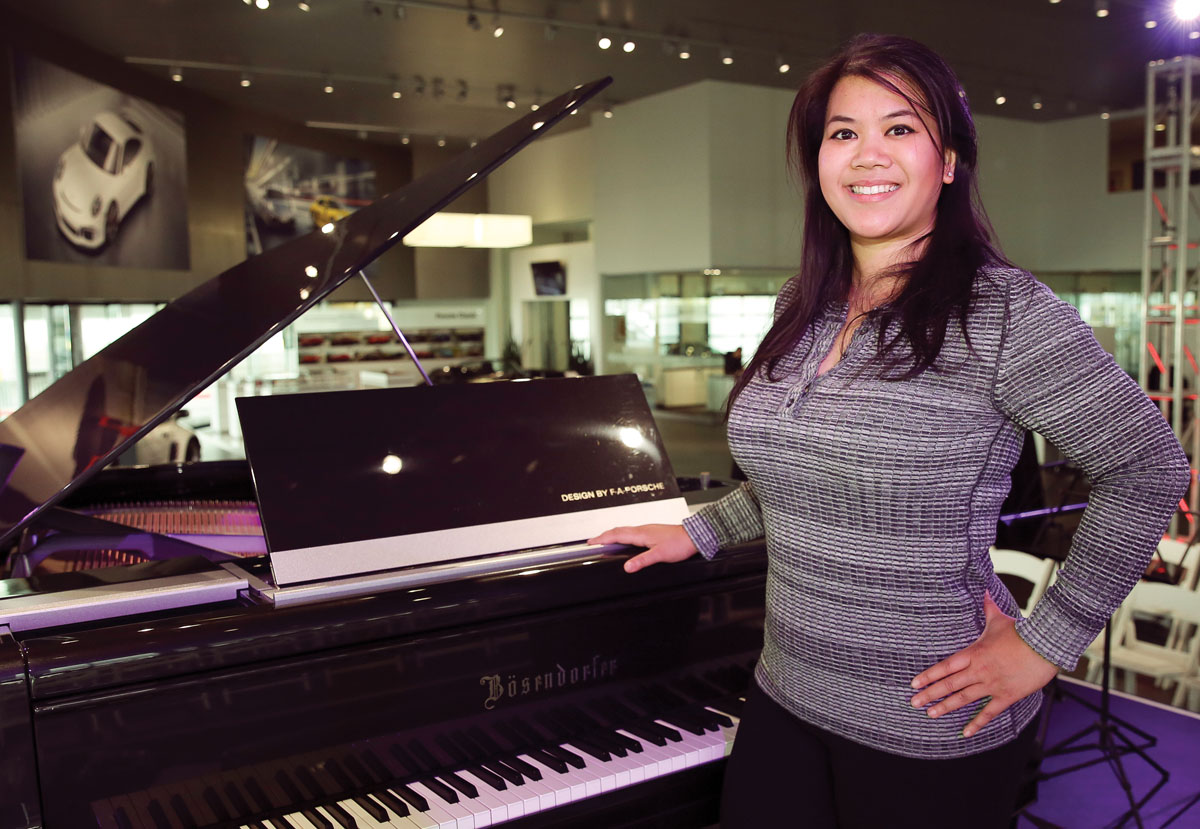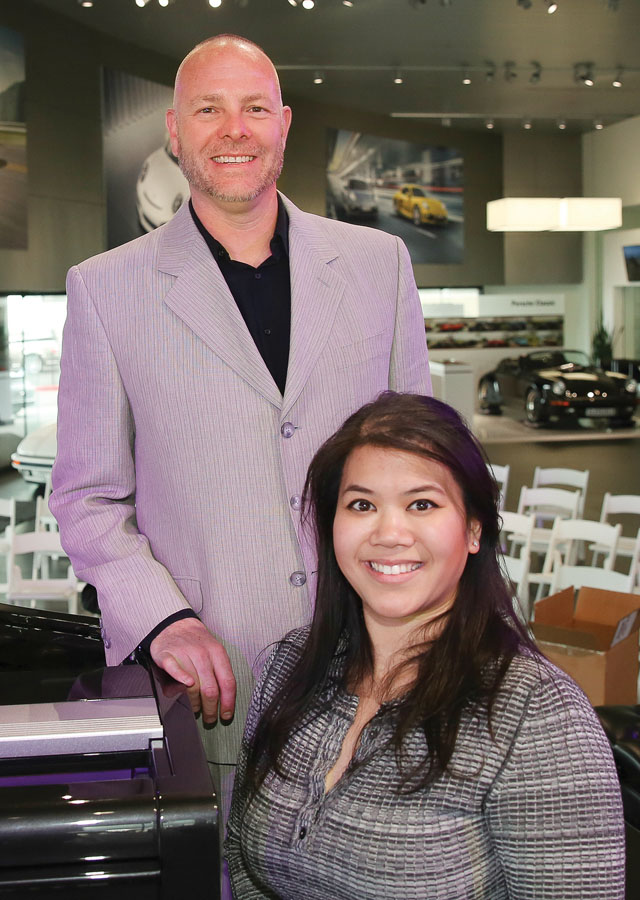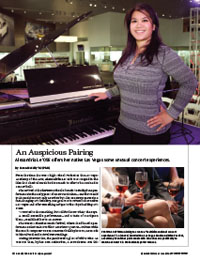Alumni Gazette
 FESTIVAL SETTING: Aiming to create a “multidimensional concert experience,” Le founded the Las Vegas Music and Wine Festival, a multiday event that pairs music with wine chosen specifically to match each work in the festival’s performances. (Photo: Bizuayehu Tesfaye/AP Images for Rochester Review)
FESTIVAL SETTING: Aiming to create a “multidimensional concert experience,” Le founded the Las Vegas Music and Wine Festival, a multiday event that pairs music with wine chosen specifically to match each work in the festival’s performances. (Photo: Bizuayehu Tesfaye/AP Images for Rochester Review)From the time she was a high school student at the Las Vegas Academy of the Arts, Alexandria Le ’05E was steeped in the idea that classical music had too much to offer to be confined to concert halls.
She arrived at the Eastman School of Music to study piano performance in the early years of a new curriculum—one that would train musicians not only as artists but also as entrepreneurs in a fast-changing arts industry. Her goal was to return to her native Las Vegas and offer something unique to the city’s budding arts scene.
“I wanted to do something, but I didn’t know what,” she says.
A small ensemble performance—and a taste of sauvignon blanc—would lead her to an answer.
She was at a chamber music festival, where she’d heard a performance of Antonín Dvořák’s “American” Quartet—written while the Czech composer was on a summer holiday in Iowa, as an ode to his cultural and natural surroundings.
During intermission, she purchased a glass of white wine. Le was not then, by her own estimation, a connoisseur. But this particular wine, she recalls, “tasted grassy.” “Intuitively,” she says, “I knew it worked.”
The pairing wasn’t intentional. But what if it had been? Says Le: “I felt, why doesn’t this happen more often? Maybe I should look and see if people do this.”
She pursued the idea cautiously. “I wanted to respect the art on both sides,” she says, recalling the first time she approached a sommelier with her idea. But that sommelier was intrigued and introduced her to a friend in the business, Las Vegas sommelier Jaime Smith.
Together Le and Smith would prove an auspicious pairing.
In 2015, Le created the Las Vegas Wine and Music Festival (since renamed the Las Vegas Music and Wine Festival), with Smith as sommelier-in-residence. The inaugural festival was a three-evening affair that took place at the Nevada State Museum. This past spring, the festival took place at Gaudin Porsche of Las Vegas, North America’s largest Porsche showroom. Another festival is in the works for spring 2018.
The festival has fulfilled Le’s mission of creating a “multidimensional concert experience.” Le selects music around a theme. Smith immerses himself in the recordings she gives him and then selects a wine to pair with each piece.
Smith is unusually well suited to a project that would pair two sensory experiences. Twice named the nation’s best sommelier by Food & Wine magazine, he has synesthesia, a rare condition in which one form of sensory stimulus generates a response in another. He smells in colors and shapes. He can taste music. “I can taste notes, and then I can taste colors that I associate with the music and movements within the music,” he says.
 PARTNERS IN WINE: In Smith (standing), a sommelier who has a condition in which his sensory stimuli intermingle, Le found
a partner who understood her goal of expanding the sensory palette of music. (Photo: Bizuayehu Tesfaye/AP Images for Rochester Review)
PARTNERS IN WINE: In Smith (standing), a sommelier who has a condition in which his sensory stimuli intermingle, Le found
a partner who understood her goal of expanding the sensory palette of music. (Photo: Bizuayehu Tesfaye/AP Images for Rochester Review)The musicians who perform at the festival are ones Le recruits locally as well as from around North America. They’re not only fine musicians—members of the Metropolitan Opera Orchestra, the New York City Ballet, and the Orpheus Chamber Orchestra among them—but also artists who are ready and willing to rub elbows with guests. Le introduces each piece and why she chose it. Smith follows, discussing how and why he selected each pairing. The guests listen and sip and after each performance, enjoy hors- d’oeuvres with Le, Smith, and the musicians, asking questions and talking about their reactions.
Le, who surveys her guests, is delighted that the majority of respondents say they don’t have much familiarity with classical music. “They were the ones to come up to me,” she adds, recalling the inaugural festival. “A man approached me and said, ‘I didn’t expect that first piece to happen the way that it did. That was so moving.’ ”
Smith believes the festival is “the only experience like this.”
“There are people out there trying to pair everything that you can with wine,” says the plainspoken sommelier, who delights in puncturing preconceptions about wine connoisseurs. “I don’t know how to say this without sounding like a jerk. I think that they’re trying to provide a nice experience, but most of the time it isn’t done well. Most of the time it’s a lot of personal preferences more than great pairings.”
When it comes to his partner, “Alex is the best in the world,” says Smith, referring broadly to her stature not only as a musician and performer, but also as someone driven by the value of service. The festival is just one of Le’s projects. In fact, its core mission is to serve as a fundraiser for the larger, umbrella organization she’s founded, Notes with a Purpose.
It’s an outgrowth of a national movement among classical musicians to reach a broader public than in the past. With Le as executive artistic director, the organization targets school children in high- poverty areas and adults without the mobility or the means to attend concert hall performances.
As with the festival, she and other musicians she’s recruited to perform in shelters, hospices, and schools don’t set themselves apart from their listeners. They’re there to interact, something that’s especially valuable to the student musicians at her alma mater, whom she’s recruited to play regularly at the Las Vegas Rescue Mission’s homeless shelter, food pantry, and addiction recovery program. While the music contributes to the lives of mission clients, it also aids young musicians in honing their public speaking as well as musical performance skills.
“It’s not enough, I think, for a musician to be comfortable with the routine of walking on the stage, bowing, playing, leaving,” Le says.
“It’s actually a little bit odd when I have to do that now.”

